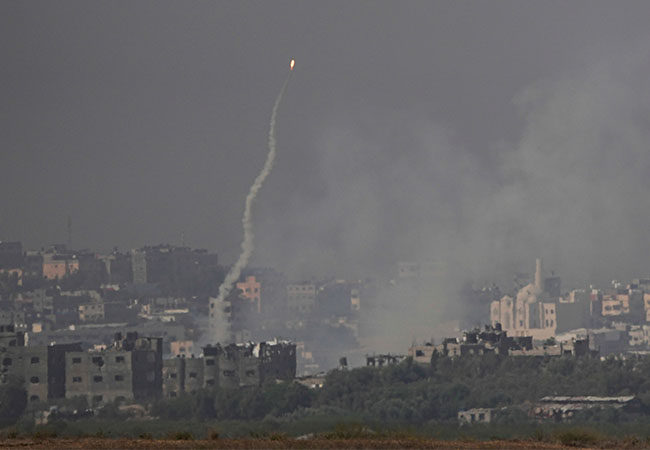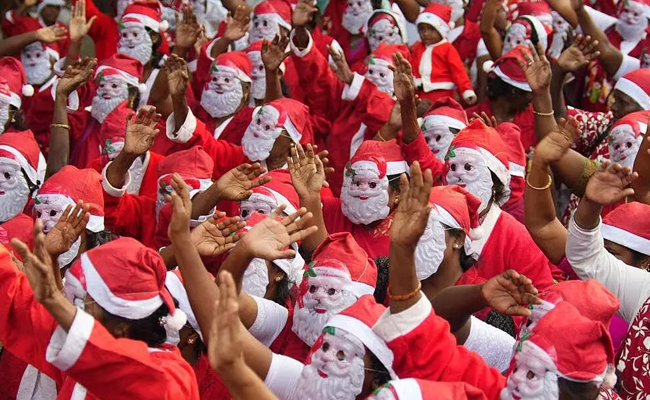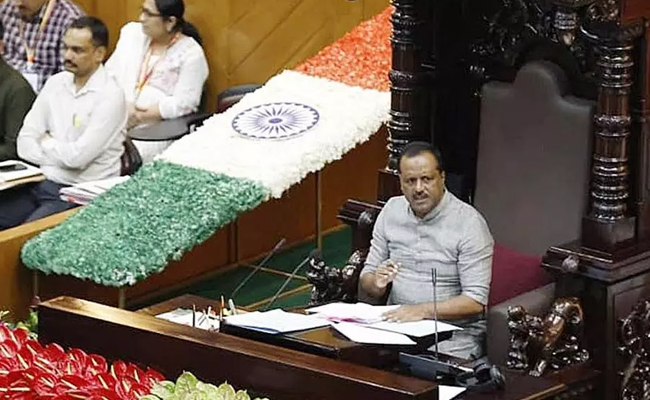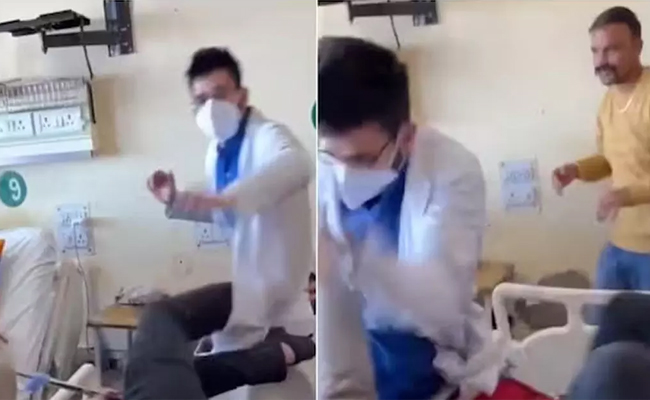Rafah (Gaza Strip) (AP): Israel ramped up its airstrikes on Monday in Gaza, where the death toll was rising rapidly, and the United States advised Israel to delay an expected ground invasion to allow more time to negotiate the release of hostages taken by Hamas militants.
A third small aid convoy from Egypt entered Gaza, where the population of 2.3 million has been running out of food, water and medicine under Israel's two-week seal. With Israel still barring entry of fuel, the UN said its distribution of aid would grind to a halt within days when it can no longer fuel its trucks.
Gaza hospitals are struggling to keep generators running to power life-saving medical equipment and incubators for premature babies.
Heavy airstrikes demolished buildings across Gaza, including in areas where Palestinians were told to seek refuge, killing hundreds and sending new waves of wounded into already packed hospitals, according to Palestinian officials and witnesses. After a strike in Gaza City, a woman with blood on her face wept as she clasped the hand of a dead relative. At least three bodies were sprawled on the street, one lying in a gray stream of water.
Israel is widely expected to launch a ground offensive in Gaza, vowing to destroy Hamas after its brutal October 7 rampage into southern Israeli communities. That is raising fears of the war spreading beyond Gaza and Israel, as Iranian-backed fighters in the region are warning of possible escalation, including targeting US forces deployed in the Mideast.
The US has told Iranian-backed Hezbollah in Lebanon and other groups not to join the fight. Israel has frequently traded fire with Hezbollah, which is armed with tens of thousands of rockets.
Israeli warplanes have struck targets in the occupied West Bank, Syria and Lebanon in recent days.
The US advised Israeli officials that delaying a ground offensive would give Washington more time to work with regional mediators on securing the release of people captured by Hamas during its deadly incursion, according to a US official.
The official, who requested anonymity to discuss the private discussions, said it was unclear how much the argument will "move the needle" on Israeli thinking. Hamas released an American woman and her teenage daughter last week in what it said was a humanitarian gesture mediated by Qatar.
Israeli Defence Minister Yoav Gallant told troops near Gaza to keep preparing for an offensive "because it will come". He said it will be a combined offensive from air, land and sea but did not give a timeframe.
Tanks and troops have been massed at the Gaza border, and Israel says it has stepped up airstrikes to reduce the risk to troops in the next stages. A ground excursion is likely to dramatically increase casualties in what is already the deadliest by far of five wars fought between Israel and Hamas in less than 15 years.
More than 1,400 people in Israel have been killed mostly civilians slain during the initial Hamas attack. At least 222 people were captured and dragged back to Gaza, including foreigners, the military said Monday, updating a previous figure.
More than 5,000 Palestinians, including some 2,000 minors and around 1,100 women, have been killed, the Hamas-run Health Ministry said on Monday. That includes the disputed toll from an explosion at a hospital last week. The toll has climbed rapidly in recent days, with the ministry reporting 436 additional deaths in just the last 24 hours.
Israel said it had struck 320 militant targets throughout Gaza over the last 24 hours in preparation for "a maneuver", an apparent reference to a ground operation. The military says it does not target civilians, and that Palestinian militants have fired over 7,000 rockets at Israel since the start of the war.
The Israeli military released footage showing what it said were attacks on Hamas infrastructure. Flashes of yellow light were followed by an explosion as multi-story buildings collapsed or toppled over.
Israel carried out limited ground forays into Gaza. On Sunday, Hamas said it destroyed an Israeli tank and two armored bulldozers inside the territory it has ruled since 2007. The Israeli military said a soldier was killed and three others were wounded by an anti-tank missile during a raid inside Gaza.
The military said the raid was part of efforts to rescue hostages. Hamas hopes to trade the captives for Palestinian prisoners held by Israel.
On Monday, the Palestinian Red Crescent said 20 trucks entered Gaza carrying food, water, medicine and medical supplies, through the Rafah crossing with Egypt, the only way into Gaza not controlled by Israel. It was the third delivery in as many days, each around the same size.
The aid coming in so far is "a drop in the ocean" compared to the needs of the population, said Thomas White, the Gaza director of the UN agency for Palestinian refugees, UNRWA. The UN has said 20 trucks amounts to 4 per cent of an average day's imports before the war and that hundreds of trucks a day are needed.
White said the agency had only three days of fuel left for its trucks. The supplies coming through Rafah are reloaded onto UNRWA and the Red Crescent trucks to take to hospitals and UN schools, where hundreds of thousands of people are taking shelter, running low on food and largely drinking contaminated water.
An airstrike hit a residential building some 200 metres (yards) from the UN headquarters in Rafah on Monday, killing and wounding several people, according to an Associated Press reporter at the scene, underscoring the perils of humanitarian operations.
After a day of intense strikes, Rafah's Abou Youssef Al-Najjar Hospital registered 61 deaths since Monday morning, its spokesperson said. With no room left in the morgue, more half the bodies were lying in the hospital grounds, spokesperson Talaat Barghout said.
More than half the territory's population have fled their homes, and hundreds of thousands are sheltering in UN-run schools and tent camps.
The World Health Organisation said seven hospitals in northern Gaza have been forced to shut down due to damage from strikes, lack of power and supplies, or Israeli evacuation orders.
Israel repeated its calls for people to leave northern Gaza, including by dropping leaflets from the air. It estimated 700,000 have already fled. But hundreds of thousands remain. That would raise the risk of mass civilian casualties in any ground offensive.
Let the Truth be known. If you read VB and like VB, please be a VB Supporter and Help us deliver the Truth to one and all.
Palakkad: A group of children celebrating Christmas through a carol roadshow was allegedly attacked by BJP workers in Kerala’s Palakkad district on Sunday night.
According to local reports, the incident occurred in Pudussery area of Palakkad, where over 25 children, mostly aged around 13, were moving from house to house singing Christmas carols. Reports state that a BJP worker identified as Ashwin Raj, along with others, allegedly assaulted the children and vandalised their musical equipment.
According to the police and eyewitness accounts, the children were using a band set that belonged to a local CPI(M) office, which had the party’s name written on it.
Allegedly objecting to this, the accused and his associates reportedly lured the children on the pretext of offering them money and then assaulted them. The band set used by the children was also smashed.
ALSO READ: Punjab: Duped of Rs 8 crore in cyber fraud, ex-IPS officer Amar Chahal shoots self in Patiala
The Town Police have arrested Ashwin Raj, a local BJP worker who has been named as the prime accused in the case. Efforts are underway to trace and arrest the remaining accused who fled the scene.
Speaking to the media, one of the injured children said, “We were using the band just for fun. When they saw that it had CPM written on it, they took us aside and beat us.”
"We had given the band set that was in our office out of love when the children asked for it. The fact that these young children, who do not know the intricacies of politics, were attacked shows the criminal mentality of the BJP workers," local CPIM leaders expressed outrage.
A police officer told PTI that the arrested accused is already booked under the Kerala Anti-Social Activities (Prevention) Act (KAAPA).
The sections invoked include Section 192 (provocation with intent to cause a riot), Section 115(2) (voluntarily causing hurt), and Section 110 (attempt to commit culpable homicide), police added.





